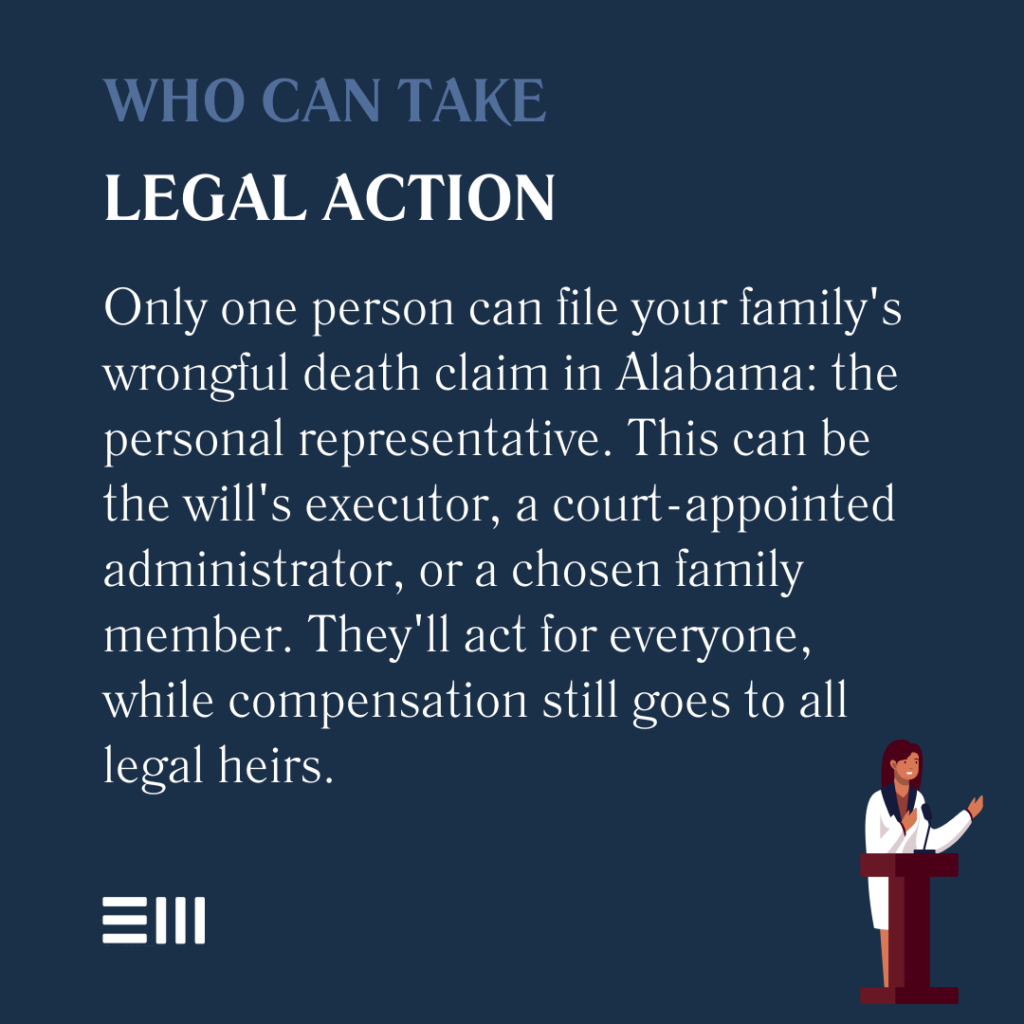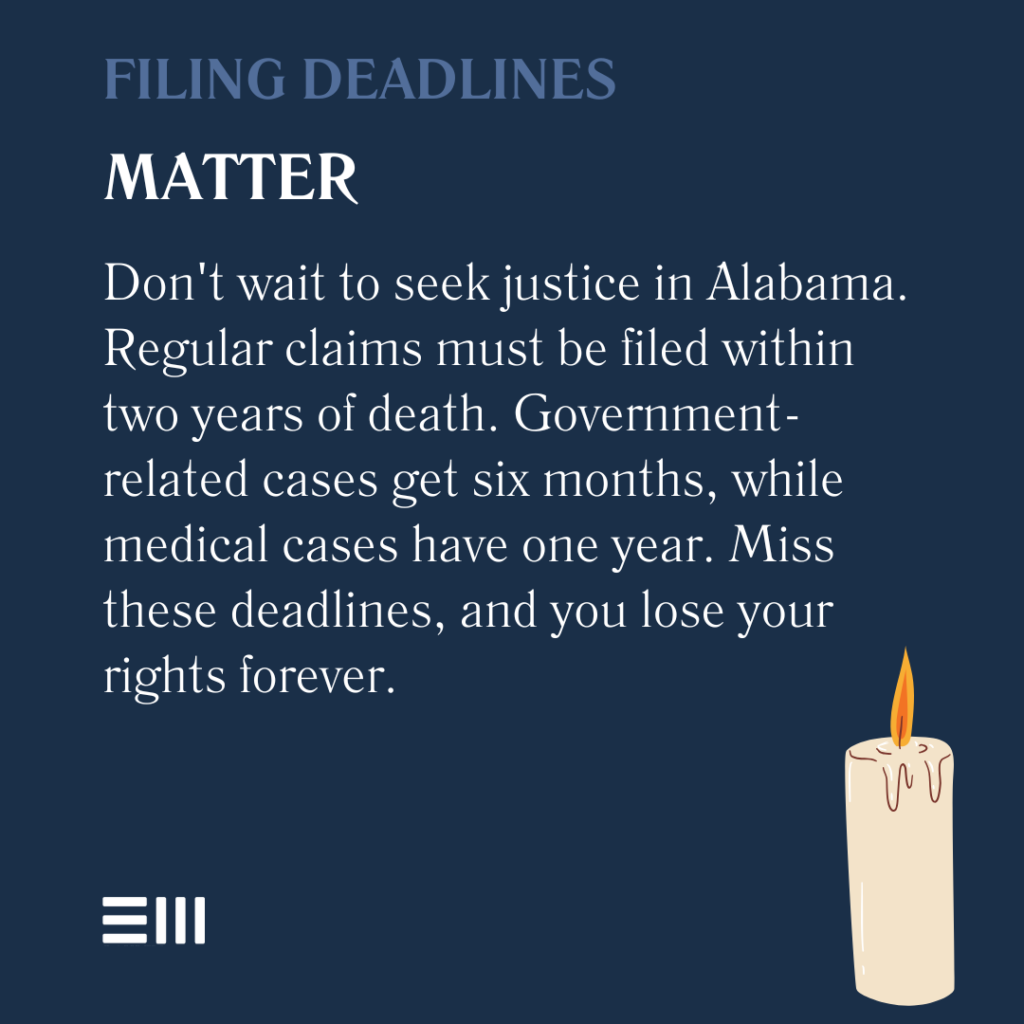
The phone call comes without warning. A workplace accident. A medical error. A fatal collision.
In an instant, a family’s world shatters, leaving behind not just an empty chair at the dinner table but a maze of questions about the future.
While no legal action can fill the void of losing a loved one, Alabama law provides a path for families to seek accountability and ensure financial stability in the wake of their loss.
Understanding Wrongful Death Claims in Alabama
The sudden loss of a family member creates ripple effects that touch every aspect of survivors’ lives.
Alabama law provides specific protections for families who have lost loved ones due to others’ negligent or wrongful actions.
These laws ensure families can seek both justice and financial stability during their time of grief.
What Qualifies as a Wrongful Death in Alabama?
Understanding what constitutes a wrongful death claim helps families determine if they have grounds for legal action.
Here are the most common scenarios that may qualify:
- Medical malpractice resulting in death;
- Fatal car accidents caused by negligent drivers;
- Workplace accidents with fatal outcomes;
- Deaths from defective products;
- Fatal slip and fall accidents on unsafe premises; and
- Deaths resulting from nursing home neglect.
Each of these situations requires careful evaluation of circumstances and evidence to build a strong legal case. Working with experienced legal counsel can help determine if your situation qualifies under Alabama law.
Legal Rights of Surviving Family Members
Navigating the legal landscape after losing a loved one requires understanding several key aspects of Alabama law.
These rights protect families while ensuring proper representation throughout the legal process.
Who Can File a Wrongful Death Claim
Alabama law establishes specific guidelines about who can pursue legal action in wrongful death cases.
The following parties may be eligible to serve as representatives:
- The executor named in the will;
- A court-appointed administrator; and
- A family member appointed by the probate court.
Understanding your role and rights as a representative is crucial for protecting the interests of all beneficiaries throughout the legal process.

Time Limits for Filing a Claim
Strict deadlines govern when families must take legal action after losing a loved one.
Here are the key timeframes to remember:
- Two years from the date of death for most cases;
- Six months for claims against governmental entities; and
- One year for certain medical malpractice cases.
Acting promptly within these timeframes is essential, as courts rarely make exceptions for missed deadlines, even in compelling circumstances.

Types of Compensation Available
When pursuing a wrongful death claim in Alabama, families should understand that compensation works differently than in other states.
Our state’s unique approach focuses on specific types of damages and considerations.
Punitive Damages in Alabama
Alabama’s approach to wrongful death compensation differs significantly from other states.
Here are the key aspects of punitive damages:
- Punish wrongful conduct;
- Deter similar behavior by others;
- Protect society from dangerous practices; and
- Provide compensation to surviving family members.
These damages serve multiple purposes, helping both individual families and society as a whole by discouraging negligent behavior.
Recoverable Economic Impacts
While pursuing a claim, various financial factors come into consideration.
The following elements often influence damage awards:
- Lost future income;
- Medical expenses before death;
- Funeral and burial costs;
- Loss of benefits and inheritance; and
- Loss of household services.
Understanding these potential components helps families and their legal representatives pursue appropriate compensation levels for their specific situation.
Steps to Protect Your Family’s Rights
Taking the right actions in the weeks and months following a wrongful death can significantly impact your case’s outcome.
Understanding and following these steps helps preserve your legal options.
Important Initial Steps
After losing a loved one, taking proper actions can significantly impact your legal rights.
Consider these essential steps:
- Obtain official death certificate;
- Secure medical records and accident reports;
- Document all expenses related to the death;
- Avoid discussing the case on social media;
- Decline early settlement offers from insurance companies;
- Gather evidence of the deceased’s income and benefits; and
- Keep detailed records of all communications about the incident;
Following these steps creates a strong foundation for your legal case while protecting your family’s long-term interests. Remember that each action you take early in the process can have significant implications later.
Frequently Asked Questions About Wrongful Death Claims in Alabama
When facing the complex legal process after losing a loved one, many families share common concerns and questions. Below are answers to some of the most frequently asked questions we receive:
How Long Does a Wrongful Death Case Take to Resolve?
The duration varies significantly depending on case complexity, evidence availability, and whether settlement negotiations succeed. Most cases resolve within 1-3 years, though some may conclude sooner or take longer if they go to trial.
What if Multiple Parties Are Responsible for the Death?
Alabama allows claims against multiple responsible parties. Each party’s liability is determined separately, and you may pursue claims against all contributing parties simultaneously.
How Are Wrongful Death Settlements Distributed?
Settlements are distributed according to Alabama’s intestate succession laws, regardless of the deceased’s will.
The primary beneficiaries are typically:
- Surviving spouse and children;
- Parents if no spouse or children exist; and
- Siblings if no spouse, children, or parents survive.
This distribution system ensures that close family members are protected, though working with an attorney can help navigate any unique family situations that may affect the distribution process.
What Evidence Is Needed to Prove a Wrongful Death Claim?
Strong claims typically require:
- Medical records and death certificate;
- Accident or incident reports;
- Witness statements;
- Expert testimony;
- Financial documentation; and
- Proof of negligence or wrongful conduct.
These questions represent just a fraction of the concerns families often have during this process. Each case presents unique circumstances that may require specific legal strategies and solutions.
Taking the Next Step: Securing Your Family’s Future
Legal action can’t reverse your loss, but it can provide financial security and hold responsible parties accountable.
Our experienced Alabama wrongful death attorneys stand ready to guide your family through this challenging process with compassion and dedication.
Contact us today for a confidential consultation about your family’s legal rights.
Can't find what you're looking for? Search our site below.










